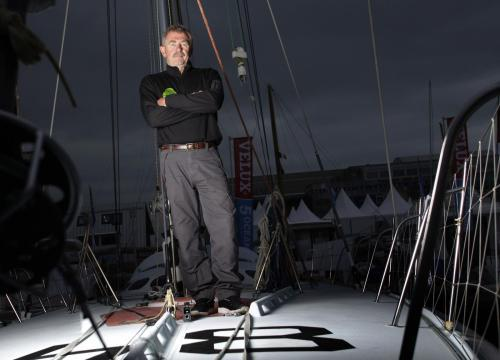Oceans ‘dying very quickly’: Canada’s most experienced solo yachtsman
By Chris Morris, Times & Transcript Staff
2 July 2011 Derek Hatfield has always known about the loneliness of the long-distance sailor, but he’s never felt as alone as he does these days when racing over the vast, empty expanses of our dying oceans. Hatfield recently completed his second successful race around the world, sprinting to a third place finish in the grueling VELUX 5 Oceans competition, a solo round-the-world ocean race that is held every four years. But the last eight months have been an eye-opener for the New Brunswick-born sailor when it comes to the state of the world’s oceans. Streaking across the open waters in a sleek, 60-foot yacht that affords him a unique, close-up view of marine life, he has been troubled by what he is not seeing. “You don’t see the fish, you don’t see the turtles, you don’t see the birds,” Hatfield said in an interview from Nova Scotia, where he now lives. “Along the coast you will see the odd humpback whale but it is getting more and more rare. Last year I did a transatlantic race and I didn’t see one whale in the whole 15 days of racing across the North Atlantic. Not one whale! … The oceans are dying and they’re dying very quickly.” He especially misses the company of dolphins. Hatfield, who has been making long sea voyages since the early 1990s, says he always used to stop what he was doing when dolphins showed up to race beside the bow of the boat or follow behind. “It is much lonelier without them,” he says. […] Alex Rogers of Oxford University, scientific director of the International Program on the State of the Ocean, which convened the expert panel, told Canadaeast News Service the most frightening finding is the quickening pace of change. Rogers said in an interview from Oxford that the state of the oceans is declining far more rapidly than even the most pessimistic anticipated. Rogers said climate change is the biggest factor, warning that the rate at which carbon is being pumped into the oceans is already far greater than it was at the time of last major extinction of marine species, 55 million years ago. “The thing is the rate at which we are seeing change now is unprecedented,” Rogers said. “The rate of carbon dioxide emissions is huge compared to the past. The closest comparison we have to our present time is about 55 million years ago and at the moment we’re pumping carbon dioxide into the atmosphere at about 10 times the rate at which it was entering the atmosphere during that period, which was associated with a major extinction.” […]

Thanks for writing about this. Glad there are still some people like you who value our world's oceans. Maybe the least we can do is disposing of our items properly. Check this video out. http://youtu.be/qQUECrYE2bY